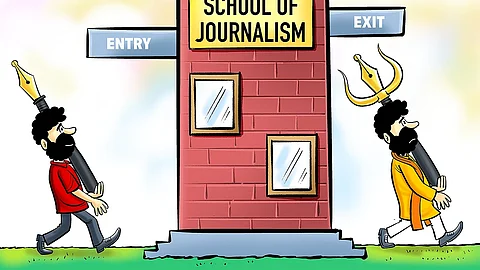

“Joote se peetungi (I’ll beat you up with my shoe). Keep quiet.”
This isn’t a dialogue from a television show or movie, or a snapshot of a fight on a street. It’s what Bharati Gore, the honorary director of the Delhi School of Journalism, said to students in a viral clip last month when they approached her with concerns about their college’s infrastructure and high fees.
This incident epitomises all that seems to be wrong with the journalism school today. The problem lies far beyond infrastructure, placement and fees – students and alumni told Newslaundry about a culture of repression and a push for right-wing thought, almost to the exclusion of all else.
In the words of one student, “It’s a saffronised madhouse.”
Last January when the Prime Minister was inaugurating the Ram Mandir in Ayodhya, a mini consecration ceremony for the new temple took place within the hallowed corridors of DSJ.
When curious students asked participants what was going on, they learned the event had been organised by the Akhil Bharatiya Vidyarthi Parishad, the student wing of the Rashtriya Swayamsevak Sangh. The RSS is the parent organisation of the Bharatiya Janata Party, which has had the Ram Mandir in Ayodhya at the heart of its political campaigns for decades. It had spearheaded the rally that resulted in the razing of the 16th century Babri Masjid in 1992.
But the DSJ event wasn’t remarkable.
Past and present students told Newslaundry they saw only Hindu festivals being celebrated on campus. As Himanshu Chauhan, a second-year undergraduate student, said, “The college tends to celebrate only certain Hindu festivals.”
“Schools and colleges are supposed to be secular spaces, but that was often violated. Within the institution, the administration itself would organise such events. In my three years there, I only saw the college celebrate Hindu festivals, never those of any other religion,” said Devansh Solanki, who studied for a Bachelor’s degree in journalism at DSJ between 2020 and 2023.
As Uthara, a former DSJ student said, “The repression was rising across [Delhi] university spaces. But at DSJ, it...was impossible to even ask a question.”
DU’s answer to Columbia Journalism School
The proposal to set up an institution dedicated to journalism in Delhi University was first announced during a press conference on November 19, 2016. Vice Chancellor Yogesh Tyagi declared the DSJ would open by end-2016. Ultimately, the first academic session at the college commenced on September 26, 2017 and the formal inauguration took place on December 22, 2017. Students from the first batch recall how Tyagi would liken the college to New York’s Columbia Journalism School.
DSJ offers two programs: the Five-Year Integrated Program in Journalism (latest fee: Rs 79,820) and Master of Journalism (latest fee: Rs 69,620). As part of National Education Policy (NEP), the programs have multiple exit options – students can be awarded a certificate, diploma, or degree as per DU guidelines.
Thecurrent honorary director is Professor Bharati Gore, who is also a professor in DU’s Hindi department. DSJ has an interim advisory board with 11 members. These include Sachidanand Joshi, member secretary, Indira Gandhi National Centre for the Arts; SP Sharma, director of south Delhi campus; Professor Rama Sharma, principal of Hansraj College; and Anoop Lather, chairperson of DU’s Culture Council and the university’s public relations officer.
Joshi was among the 47 academicswho wrote against “leftist” historians in 2015. Sharma has previously called for a ban on non-vegetarian food on campus and was embroiled in controversy for allegedly constructing a gaushala (cow shelter) on land earmarked for a women’s hostel.
Also on DSJ’s advisory board are the following: Anjana Om Kashyap, managing editor of Aaj Tak; Dinesh Gautam, senior executive editor at TV9 Bharatvarsh; Abhinav Bhatt, executive editor at NDTV; Hitesh Shankar, editor of Panchjanya, a magazine published by the RSS; Rohit Panwar, general manager at Zee Media Corporation, whose posts on Twitter show him to be a BJP supporter; Richa Anirudh, who previously worked with Zee News; and Rajshree Rai, editor-in-chief of APN News, a 24x7 news portal whose national coverage largely focuses on Prime Minister Modi’s activities. (The channel is owned by self-proclaimed ‘veteran journalist’ Suresh Kumar.)
Out of the 11 members, more than half are closely linked to the BJP and RSS while the media corporations represented in the board are known for promoting narratives favouring the current BJP-led government.